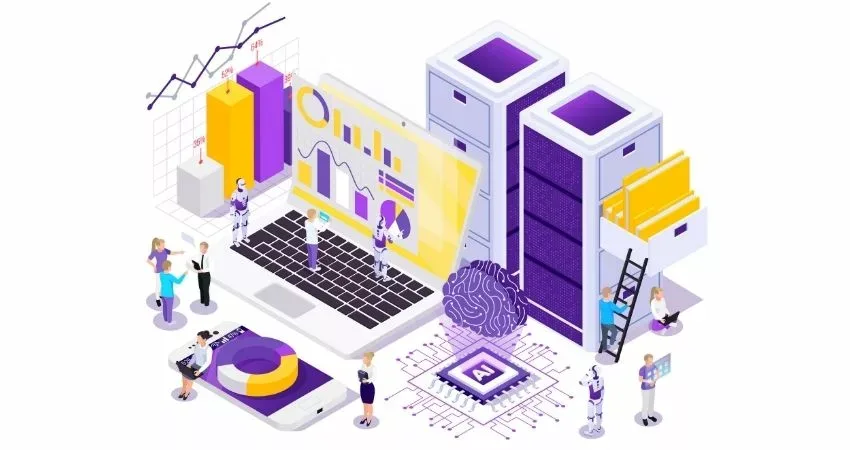Marketing Automation trends offer insights into how businesses use the solution to evolve marketing strategies. Moreover, marketing automation trends increase opportunities for businesses at a rapid pace.
Change is inevitable, and Marketing shows how it adopts these changes per requirements. Further, following marketing automation trends helps companies embrace and accept the digital transformation.
Moreover, according to a report by Mordor Intelligence, “The marketing automation software market was estimated at USD 3.60 billion in 2020 and is expected to be USD 11.46 billion in 2027, registering at a CAGR of 17.67% through the forecast period (2021-2027). Owing to the increasing significance of marketing in generating sales and customer retention, marketing services are witnessing a rise in their spending.”
With advancements in technological phenomena, the marketing industry has an astonishing evolution. Therefore, it is pivotal for businesses to comprehend the marketing automation trends. This article will understand more about Marketing automation, its benefits, and trends.
Game Changer for Business – The Ultimate Marketing Automation Trends
What is Marketing Automation?
Marketing Automation is a component of marketing to enable marketing professionals to automate sending messages and emailers to the target audience. It also ensures that the messages are sent under specific scenarios to a particular audience at a specific time.
That is to automate tasks for social media, SMS, and other digital processes. It also aims to offer solutions to automate B2B and B2C marketing processes. It executes automatic, simple, repetitive tasks while mitigating human interference.
Moreover, Gartner states, “Marketing automation is software that assists marketers with customer segmentation, customer data management and campaign management. It provides marketers with the ability to offer real-time, targeted, data-driven campaigns along with enhanced efficiency and productivity.”
Above all, it harnesses machine learning and artificial intelligence capabilities to comprehend customer behavior. Moreover, it uses the data from user interactions on websites, email responses, social media conduct, etc. Hence, it helps develop relevant and significant content for audiences.
Most importantly, marketing automation has become a pivotal technique for successful business opportunities. Therefore, to sustain operations in this technological era, businesses need automation.
Businesses also use automation to engage with audiences through emailers, websites, social media, messages, etc. As a result, it enables lead generation and cultivation to comprehend ROI on the campaigns.
Benefits of Marketing Automation
- Firstly, Marketing Automation enhances efficiency by reducing staffing costs. It also paves the way for employees to contribute to strategic projects.
- Moreover, marketing automation and sales operations are great for achieving company goals. It also develops the process to provide quality leads from marketing to sales.
- Further, it enables teams to be more effective and helps increase conversion rates. Moreover, it helps manage leads and teams proficiently to track leads and potential targets.
- Marketing automation solutions also help collate reports and analytics for operations. It also offers an efficient analysis with accuracy and streamlines reports to objectives.
- It also enables businesses to engage with audiences using personalized marketing strategies. Moreover, it segments and categorizes frequent website visitors as marketing leads. Hence, the solutions aim toward these leads with social media, paid ads, email campaigns, etc.
- Moreover, it manages the data of leads and their engagement in various marketing activities.
- Further, it develops processes according to scalable opportunities. It also mitigates the dependencies by reducing manual processes and automating repetitive tasks.
Key Marketing Automation Statistics
- According to Email Monday, 52% of businesses now implement Marketing Automation. It also states that about 58 % of B2B businesses are inclining toward adapting to the technology.
- Further, Research and Markets report, “The global marketing automation market size is expected to reach USD 8.42 billion by 2027, expanding at a CAGR of 9.8% from 2020 to 2027.”
- Forrester also accounts, “B2B marketers using marketing automation increased their sales pipeline contribution by an average of 10%.”
- Oracle’s report explains, “Marketing teams have many jobs, but they only have one goal—to increase revenue. Therefore, they need the right tools to work more efficiently, collaborate more effectively, and engage with customers better. And this is what drew them to marketing automation software in the first place.
-
- 35% want to streamline marketing and sales efforts
- 34% want to improve customer engagement
- 34% want to improve the customer experience (CX)
- 30% want to minimize manual tasks
- 28% want to increase the number of leads captured”
- Further, Invespcro states, “According to recent studies, marketing automation on average drives upto 14.5% increase in sales productivity and a 12.2% reduction in marketing overhead. 80% of marketing automation users saw an increase in the number of leads using marketing automation software, and 77% had an increase of conversions. 91% of marketing automation users agree it is “very important” to the overall success of their online marketing activities.”
Here are the Marketing Automation Trends in 2022
-
Next-Gen Marketing Automation with AI and Machine Learning:
Firstly, AI and machine learning bring advancements to every industry that incorporate its solutions. For instance, Hubspot enables businesses to generate communities and align campaigns for their target audience. It also offers features to emphasize developing and enhancing a process rather than executing the campaign from scratch.
With the rise in online consumers, there is a significant increase in queries and inquiries. A human agent may only handle a handful of questions at a time. Companies incorporate automated chatbots to assist various queries simultaneously. Modern chatbots automate responses to messages depending on the nature of the issues. Machine learning develops algorithms and provides appropriate responses.
“The global chatbot market size is expected to reach USD 2,485.7 million by 2028, according to a new report by Grand View Research, Inc. The market is anticipated to expand at a CAGR of 24.9% from 2021 to 2028. The chatbot industry is expected to witness significant growth over the forecast period as they enable enterprises to substantially reduce operating costs. Additionally, innovations in artificial intelligence and machine learning technologies are likely to enhance the features of chatbots, which act as a major driver for the market.”
Companies like Netflix and Starbucks are also implementing AI and Machine Learning capabilities for hyper-personalized experiences for customers.
-
Content Personalization to Increase Customer Engagement:
We now live in a complex marketing environment, where there are new competitors, categories of customers, and an increase in communication channels. As a result, personalized content is the need of the hour to gain a competitive advantage, reach customers, and dominate communication channels.
Businesses must understand why their subscribers joined their mailer list to understand the strategy. They must also comprehend the stage of the sales cycle. Hence, sending the same email to all subscribers may not acquire the same response. Therefore, this might lead them to unsubscribe.
Hence, businesses must indulge in creating customized content for their subscribers to prevent this. Therefore, this paves the way for companies to improve engagement with their subscribers. As a result, it helps achieve objectives, retains loyal customers, and ensures quality leads.
-
Omnichannel Marketing Experience for Relevant Interaction:
Omnichannel marketing experience refers to customer engagement across multiple channels. Moreover, these channels include interaction via websites, social media, SMS, etc., leading to a coherent customer cycle. Further, it generates a seamless environment that delivers information to customers the way they want it.
Most importantly, marketers do not just depend on a single channel or mode of communication to interact with their customers. Moreover, it enables customers to interact with the business on their preferred media. Therefore, the omnichannel marketing experience offers businesses enhancements and makes them more approachable.
-
Advancement in Behaviour Analytics for a Deeper Understanding:
Pioneers like Google, Netflix, and Amazon are still developing and expanding their horizons using customer data and analytics. Moreover, behavior analytics helps businesses procure an in-depth understanding of customer requirements, issues, and actions. It also supports business objectives by capturing leads, retaining customers, and offering great value for potential and relevant customers.
According to monk and poet John Lydate, “You can please some of the people all of the time, you can please all of the people some of the time, but you can’t please all of the people all of the time.”
That is to say, the current market is a dynamic and growing environment. Businesses must realize that they have to attract relevant and significant leads. Hence, it is essential to know your audience and cater to their requirements.
-
Adopt Social Media Automation for Authenticity:
Smart Insights states, “58.4% of the world’s population uses social media. The average daily usage is 2 hours and 27 minutes (January 2022).” It further states, “4.62 billion people around the world now use social media, 424 million new users have come online within the last 12 months”
Previously, print ads, tv ads, and newspaper advertisements would only depend on the number of subscribers. Further, with the advances in technologies, businesses can now track the platforms that provide them more income. Therefore, companies, brands, and industries are now taking advantage of their audiences’ screen time. They know where their audiences are, which platforms they use regularly, and the type of advertisements they resonate with most.
-
Augmented Reality Paving the way for Unique Experiences:
Augmented Reality has always been a fascinating concept in technology that provides a narrative to impress and amuse audiences. Brands like Ikea, Amazon, Nike, Walmart, etc., use augmented reality to offer enhanced customer experiences. Moreover, it showcases how AR provides a visually stunning experience for customers worldwide.
Further, AR can support businesses by providing unique experiences via their preferred devices. For example, Gucci, the luxury brand, introduced the advanced features of “trying on” a pair of sneakers using AR. As a result, customers could quickly “try on” the team of sneakers which helped them make the buying decision. Therefore, there was a relevant increase in customer satisfaction and a significant return decrease. It paved the way for Gucci to release the first digital-only sneakers that customers could purchase.
Therefore, using AR in marketing can help customers visualize products and make buying decisions accordingly. Moreover, with the increase in NFTs and the metaverse, simulative technologies like AR, VR, MR, and XR will become more relevant and significant.
-
Product Information Management to Shape Opinions:
The consumer journey gets more complex as there is an increase in competition. Moreover, customers often indulge in research about products they are interested in. Further, aspects like online reviews often play a pivotal part in their decision to purchase the product. As a result, businesses must invest in developing a single point of reference using solutions and product information management. PIM is also a robust database that helps retrieve information about products from a single source. Further, PIM can repurpose the information for various marketing automation activities for different channels.
Conclusion:
In conclusion, marketing automation offers a great opportunity for businesses to engage, target, and create personalized experiences for their audiences using advanced technologies.
You May Also Like to Read:
Mobile Marketing Automation – Dos and Don’ts Explained


